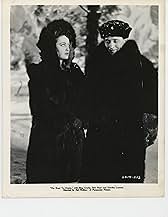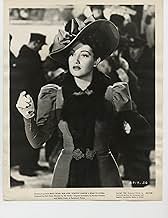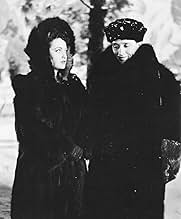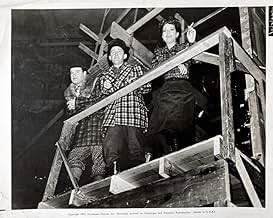CALIFICACIÓN DE IMDb
7.1/10
3.9 k
TU CALIFICACIÓN
Agrega una trama en tu idiomaTwo vaudeville flops pose as bad guys and join the Klondike gold rush with a saloon singer.Two vaudeville flops pose as bad guys and join the Klondike gold rush with a saloon singer.Two vaudeville flops pose as bad guys and join the Klondike gold rush with a saloon singer.
- Dirección
- Guionistas
- Elenco
- Nominado a 1 premio Óscar
- 3 premios ganados y 1 nominación en total
Jack La Rue
- LeBec
- (as Jack LaRue)
George Anderson
- Townsman
- (sin créditos)
Stanley Andrews
- Joe - Official at Ship
- (sin créditos)
Bobby Barber
- Bartender
- (sin créditos)
William 'Billy' Benedict
- Second Newsboy
- (sin créditos)
Carmella Bergstrom
- Woman
- (sin créditos)
Billy Bletcher
- Bear
- (voz)
- (sin créditos)
Phil Bloom
- Show Spectator
- (sin créditos)
Eddie Borden
- Man in Saloon
- (sin créditos)
Rudy Bowman
- Show Spectator
- (sin créditos)
- Dirección
- Guionistas
- Todo el elenco y el equipo
- Producción, taquilla y más en IMDbPro
Opiniones destacadas
How does this zany mid-1940's comedy/musical rate in the year 2003? I'm going to venture a guess and suggest that it probably doesn't rate as high with viewers as it may have when it was originally released. Some of the gags and one-liners seem to be about pop-culture that is obscure in the new millenium. I had a strong sense that parts of the movie were originally funny but that the humor is lost on viewers who were not alive in the 1940's.
Notwithstanding, there are some very funny bits and one-liners in this film. Here and there throughout the film, the comedy clicked and I found myself laughing out loud. On the other hand, I have watched the film twice and both times that I watched it, I was growing tired of the endless one-liners to the point that they were becoming annoying. This film definitely seems to lose quite a bit of its comic sparkle by the end, and the ending is truly idiotic.
On the other hand, I did truly enjoy several of the songs in this movie. Two that stand out are Bing Crosby singing "Welcome to My Dream" and Dorothy Lamour singing "Personality". Unfortunately, some of the good songs, especially "Welcome To My Dream" seem a bit out of place in this zany movie!
Hillary Brooke, a fine 1940's actress who appeared in a couple of Sherlock Holmes movies is totally wasted in this comedy. She looks as though she is sleepwalking through her part. Her on-screen performance comes across as if she doesn't want to be participating in this move. She is far more competent as an actress than this movie would lead you to believe.
This movie is not for all tastes. Bob Hope and Bing Crosby fans may enjoy it, but time has not been kind to this movie. I give it a 7 out of 10 points.
Notwithstanding, there are some very funny bits and one-liners in this film. Here and there throughout the film, the comedy clicked and I found myself laughing out loud. On the other hand, I have watched the film twice and both times that I watched it, I was growing tired of the endless one-liners to the point that they were becoming annoying. This film definitely seems to lose quite a bit of its comic sparkle by the end, and the ending is truly idiotic.
On the other hand, I did truly enjoy several of the songs in this movie. Two that stand out are Bing Crosby singing "Welcome to My Dream" and Dorothy Lamour singing "Personality". Unfortunately, some of the good songs, especially "Welcome To My Dream" seem a bit out of place in this zany movie!
Hillary Brooke, a fine 1940's actress who appeared in a couple of Sherlock Holmes movies is totally wasted in this comedy. She looks as though she is sleepwalking through her part. Her on-screen performance comes across as if she doesn't want to be participating in this move. She is far more competent as an actress than this movie would lead you to believe.
This movie is not for all tastes. Bob Hope and Bing Crosby fans may enjoy it, but time has not been kind to this movie. I give it a 7 out of 10 points.
Crosby and Hope are at it again, this time searching for gold in Alaska. The great lines don't run as fast and furious here as they do in some of the other "Road" pictures, but there are still plenty of laughs to go around. The film loses some points in two areas: the unnecessary and unfunny commentary by Robert Benchley and the simple fact that the premise of the film is completely ridiculous. I still cannot figure out why Crosby and Hope would spend half the film pretending to be two men they know are wanted killers. Of course, thanks to movie magic, the local authorities seem to ignore this. However, these things don't detract much from this very funny film.
If you need some laughs, this is a movie for you. I think this is the fourth of the "Road" pictures that Hope and Crosby made together. "The Road to Rio" was good, too, but the ones that followed demonstrated a flagging of inspiration.
Here, they are the crew are at their best. The plot is screwball, as usual, and not worth spelling out. What counts are the songs, the gags, and the interplay between the three principals -- Hope, Crosby, and Dorothy Lamour.
Most of the Road pictures had one or two songs which wound up on the pop charts. They were usually kind of pretty and unpretentious, "easy listening", to coin a phrase. (Oh, bring it back, sob!) "Moonlight Becomes You," "Personality," "Welcome to My World." And Bing did most of the singing in his smooth baritone. Nothing more than proficient and pleasant to listen to, although he belonged to, I think, a peppy vocal trio in the early 1930s whose arrangements were kind of original.
The gags were usually amusing, sometimes laugh-out-loud funny. There was, inevitably the occasional clunker but everything was so good natured that they are easily forgiven. The script was by Panama and Frank, but many of the jokes were improvised on the set by the actors. Hope also brought in some gags from his platoon of writers (he was a famous radio comedian at the time), giving some of them to Crosby and Lamour as well. There was a good deal of playing with the fourth wall and a lot of in jokes too. Some of these may be lost on modern viewers. Eg., Hope is driving Crosby along on a dog sled, and he raises his arms and says, "Look Ma, no hands." "Look Ma, no teeth," remarks Crosby. "Please," says Hope, "my sponsor." His radio sponsor was Pepsodent Toothpaste.
The three principal actors play off each other well. Dorothy Lamour was an unpretentious actress of modest talents who never pretended to be anything else, although she provided a very nice frame to hang a sarong on. What I like most about the relationship between Hope and Crosby is the measured equality of their stupidity and greed. Hope wasn't really subordinate to Crosby. Everything Hope said and did was within the realm of human reality. He didn't have the flapping run or squeaky voice of Jerry Lewis. He didn't get slapped around like Lou Costello. He wasn't intellectually challenged. And Crosby was much more of a participant in the goings on than a straight man would be. He's hardly less gullible than Hope, and equally cowardly. When they're about to be boiled by cannibals or hanged by vigilantes, they trade wisecracks with one another. Crosby is the promoter and Hope is the stooge, but neither is superior to the others.
This really is a relaxing ride. I spent a summer doing a sociological study of Scagway. The set gives a surprisingly good suggestion of what it still looks like. It's a dramatic place overlooked by a proud glacier the color of blue glass. And the kind of Wild West atmosphere the movie evokes isn't entirely fictional. People had names like "Soapy Smith".
Here, they are the crew are at their best. The plot is screwball, as usual, and not worth spelling out. What counts are the songs, the gags, and the interplay between the three principals -- Hope, Crosby, and Dorothy Lamour.
Most of the Road pictures had one or two songs which wound up on the pop charts. They were usually kind of pretty and unpretentious, "easy listening", to coin a phrase. (Oh, bring it back, sob!) "Moonlight Becomes You," "Personality," "Welcome to My World." And Bing did most of the singing in his smooth baritone. Nothing more than proficient and pleasant to listen to, although he belonged to, I think, a peppy vocal trio in the early 1930s whose arrangements were kind of original.
The gags were usually amusing, sometimes laugh-out-loud funny. There was, inevitably the occasional clunker but everything was so good natured that they are easily forgiven. The script was by Panama and Frank, but many of the jokes were improvised on the set by the actors. Hope also brought in some gags from his platoon of writers (he was a famous radio comedian at the time), giving some of them to Crosby and Lamour as well. There was a good deal of playing with the fourth wall and a lot of in jokes too. Some of these may be lost on modern viewers. Eg., Hope is driving Crosby along on a dog sled, and he raises his arms and says, "Look Ma, no hands." "Look Ma, no teeth," remarks Crosby. "Please," says Hope, "my sponsor." His radio sponsor was Pepsodent Toothpaste.
The three principal actors play off each other well. Dorothy Lamour was an unpretentious actress of modest talents who never pretended to be anything else, although she provided a very nice frame to hang a sarong on. What I like most about the relationship between Hope and Crosby is the measured equality of their stupidity and greed. Hope wasn't really subordinate to Crosby. Everything Hope said and did was within the realm of human reality. He didn't have the flapping run or squeaky voice of Jerry Lewis. He didn't get slapped around like Lou Costello. He wasn't intellectually challenged. And Crosby was much more of a participant in the goings on than a straight man would be. He's hardly less gullible than Hope, and equally cowardly. When they're about to be boiled by cannibals or hanged by vigilantes, they trade wisecracks with one another. Crosby is the promoter and Hope is the stooge, but neither is superior to the others.
This really is a relaxing ride. I spent a summer doing a sociological study of Scagway. The set gives a surprisingly good suggestion of what it still looks like. It's a dramatic place overlooked by a proud glacier the color of blue glass. And the kind of Wild West atmosphere the movie evokes isn't entirely fictional. People had names like "Soapy Smith".
At the turn of the century two vaudeville performers Chester (Bob Hope) and Duke (Bing Crosby) go to Alaska to make their fortune.On the way they run in all kind of weird and funny stuff, like talking animals. Road to Utopia from 1946 is one of the 'Road' films with Hope and Crosby and it's very good.These two worked really good together.Bing Crosby (1903-1977) does a very fine job in the lead.Bob Hope was a very funny man.This great comedian passed away last July of pneumonia.He had turned a hundred years last May.He had a great life and a great career and all the fans of Bob will miss him very much.He was one of the kind. Dorothy Lamour (1914-1996) is brilliant as Sal van Hoyden.This movie is filled with great gags.I recommend it to all comedy lovers out there.
'Road to Utopia' is a musical comedy starring two performers who are caught up in a conquest to find gold in Alaska. 'Road to Utopia' is a highly entertaining film, and it's easy to get caught up in the adventure.
Some of the comedy elements in the film are probably a little bit dated, but those that are not dated and still very funny and witty. (These include the narrator comments directed to films, the Paramount mountain, the talking animals, and the Santa figure emerging from the Alaskan landscape with gifts for Crosby and Hope). The music is also dated in terms of what traditional audiences enjoy today, but I still thought it was done very well and played an important part in the story.
'Road to Utopia' is enjoyable, and it is highly recommended. If you're tired of all the films made in the past 20-30 years, this is a gem.
Some of the comedy elements in the film are probably a little bit dated, but those that are not dated and still very funny and witty. (These include the narrator comments directed to films, the Paramount mountain, the talking animals, and the Santa figure emerging from the Alaskan landscape with gifts for Crosby and Hope). The music is also dated in terms of what traditional audiences enjoy today, but I still thought it was done very well and played an important part in the story.
'Road to Utopia' is enjoyable, and it is highly recommended. If you're tired of all the films made in the past 20-30 years, this is a gem.
¿Sabías que…?
- TriviaBob Hope recalled that during the scene where he and Bing Crosby were bedding down beside their cabin in the Klondike, they were to be joined by a bear. They were told that the bear was tame and its trainer would always be nearby. Against their better judgment they went along with it. However, when the cameras started filming, the bear ambled over to Hope and, instead of lying down next to him like it was supposed to, the animal sniffed him and started growling. Hope and Crosby immediately stopped the scene and refused to work with the bear any longer, despite the trainer's protestations that it was tame and harmless. The next day the bear attacked its trainer and tore his arm off.
- ErroresThe right arm of the person holding the talking fish is visible.
- Citas
[Duke loses a talent show to a trained monkey]
Chester Hooton: [to Duke] Next time I bring Sinatra.
- Créditos curiososNarrator Robert Benchley credits himself orally in a precredit sequence.
- ConexionesFeatured in Paramount Presents (1974)
- Bandas sonorasPut It There, Pal
(1946)
Music by Jimmy Van Heusen
Lyrics by Johnny Burke
Played during the opening credits and also as background music
Performed later by Bing Crosby and Bob Hope
Selecciones populares
Inicia sesión para calificar y agrega a la lista de videos para obtener recomendaciones personalizadas
- How long is Road to Utopia?Con tecnología de Alexa
Detalles
- Tiempo de ejecución1 hora 30 minutos
- Color
- Relación de aspecto
- 1.37 : 1
Contribuir a esta página
Sugiere una edición o agrega el contenido que falta

![Ver Trailer [EN]](https://m.media-amazon.com/images/M/MV5BNWRiMzM4OTktNDlkMS00YWJiLWEwNDMtZTY0ZjAwMzY3YjM2XkEyXkFqcGdeQXRyYW5zY29kZS13b3JrZmxvdw@@._V1_QL75_UX500_CR0)


































